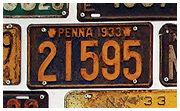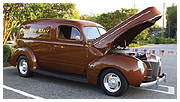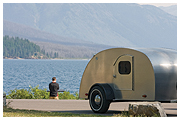<< Back to Driving Force, May 2012
LEGISLATIVE QUICK HITS
California Specially Constructed Vehicles: For the past several years, the SAN has been working with the California legislature and state agencies to provide protection for owners of improperly or illegally titled and registered specially constructed vehicles (SPCNS). Under a looming threat of prosecution, this program was pursued to help vehicle owners and builders avoid a situation that could have led to confiscated cars and felony law enforcement actions. Beginning July 1, 2011, an amnesty program to allow proper registration of previously-registered SPCNS went into effect. The program is slated to conclude on June 30, 2012. Working with the Bureau of Automotive Repair (BAR) and the Department of Motor Vehicles (DMV), the SAN has finally resolved program implementation problems on behalf of California SPCNS owners seeking amnesty. These solutions permit these vehicles to demonstrate compliance with current BAR smog-check tailpipe emissions requirements, in addition to providing amnesty for owners that have knowingly made false statements regarding the value of these vehicles, the year of manufacture or knowingly falsified any other facts in documents filed with the DMV or Highway Patrol.
Connecticut Antique/Rare/Special Interest Motor Vehicles: SAN-opposed legislation to increase the age requirement for vehicles eligible for registration as “antique, rare or special interest motor vehicles” was approved by the Connecticut Joint Committee on Planning and Development by a narrow 10-9 vote. Under the bill, vehicles seeking registration as antique, rare or special interest motor vehicles would be required to be at least 30 years old. Currently, vehicles 20 years old or older are eligible for this status and special license plates. For the purpose of property taxes, the bill also increases the maximum assessment of these vehicles from $500 to $2,500. The bill has been sent to the Connecticut House of Representatives for a vote by all members.
Hawaii Low-Mileage Credit: The SAN is supporting resolutions introduced in the Hawaii House of Representatives urging the City and County of Honolulu to create a 10% vehicle registration credit for residents who drive limited miles in their vehicles, like rarely used hobby cars. The resolutions were introduced to offset the burden put on certain vehicle owners by increased registration fees. Under the resolutions, the credit would extend to any resident who is registering their vehicle and can provide their two most recent safety inspections (at least 11 months apart) showing that less than 3,000 miles were driven between the two inspections.
Maryland Historic Vehicle Registration: SAN-opposed legislation that threatened to severely limit the use of “historic motor vehicles” is dead for the year. The SAN has committed itself to participate with bill sponsors in efforts to help enact an amended version of the bill next year that will allow these vehicles to continue to be eligible for the historic class upon their 20th year; not require collector insurance policies and retain the “occasional use” provision.
 Michigan Ethanol: The SAN is supporting legislation requiring retail dealers that offer gasoline for sale to label those pumps dispensing ethanol-blended gasoline with a notice that indicates the grade of gasoline and the percentage of ethanol contained. Under current Michigan law, gasoline that contains 10% or less ethanol is not subject to the labeling requirement. The bill provides that a person who violates the labeling requirement is liable for a civil fine up to $1,000.00 for each day the violation continues.
Michigan Ethanol: The SAN is supporting legislation requiring retail dealers that offer gasoline for sale to label those pumps dispensing ethanol-blended gasoline with a notice that indicates the grade of gasoline and the percentage of ethanol contained. Under current Michigan law, gasoline that contains 10% or less ethanol is not subject to the labeling requirement. The bill provides that a person who violates the labeling requirement is liable for a civil fine up to $1,000.00 for each day the violation continues.
Nebraska Special Interest Vehicles: SAN-supported legislation to create a registration class and special license plate for special interest motor vehicles was signed into law by Governor Dave Heineman. The new law authorizes owners of special interest motor vehicles to operate them on state roads displaying a single license plate on the rear of the vehicle. Under the new law, special interest motor vehicles are defined as those vehicles “of any age which are being collected, preserved, restored, or maintained by the owner as a leisure pursuit and not used for general transportation of persons or cargo.” Under a SAN- drafted amendment, special interest motor vehicles may be driven on the public streets and roads for occasional transportation, public displays, parades, and related pleasure or hobby activities. The SAN worked with the bill sponsor and staff to delete provisions in the original bill that would have required proof of membership in a recognized car club; forced owners to account for all daily driver vehicles owned or operated by the applicant; obligated owners to a sworn affidavit that the vehicle would not be used for daily transportation; and mandated that these vehicles be essentially unaltered from the original manufacturer’s specifications.
New Jersey Emissions Exemption: In 2010, SAN-supported legislation to extend the emissions inspection exemption to vehicles five model years old or newer was signed into law, subject to approval by the U.S. Environmental Protection Agency (EPA). Previous law only exempted vehicles four model years old or newer. The EPA has now incorporated revisions to the State Implementation Plan (SIP) submitted by the New Jersey Department of Environmental Protection to include the extension of the new vehicle inspection exemption from four years to five years. This action acknowledges the relatively minimal environmental impact of the vehicles targeted for this exemption and that it is senseless to test newer vehicles, the results of which demonstrate no significant air quality benefits.
 Pennsylvania Year-of-Manufacture Plates: SAN-supported legislation to provide vehicle owners the option of using vintage, original model-year license plates on antique and classic vehicles was signed into law by Governor Tom Corbett. Under the new law, an application fee of $75 would be charged to use year-of-manufacture plates. The law provides that vintage plates must have been issued by the state of Pennsylvania between the years 1906 and 1975, must be provided by the vehicle owner and legible from a reasonable distance. There is no obligation to pay the fee for model year license plates. Antique vehicle owners may still apply for special antique, classic or collectible plates that bear the designation ‘antique vehicle.’
Pennsylvania Year-of-Manufacture Plates: SAN-supported legislation to provide vehicle owners the option of using vintage, original model-year license plates on antique and classic vehicles was signed into law by Governor Tom Corbett. Under the new law, an application fee of $75 would be charged to use year-of-manufacture plates. The law provides that vintage plates must have been issued by the state of Pennsylvania between the years 1906 and 1975, must be provided by the vehicle owner and legible from a reasonable distance. There is no obligation to pay the fee for model year license plates. Antique vehicle owners may still apply for special antique, classic or collectible plates that bear the designation ‘antique vehicle.’
 Texas Street Rods/Custom Vehicles: The Texas Department of Motor Vehicles (DMV) has issued its policies and procedures for issuance of titles and specialty license plates to owners seeking registration as street rods or custom vehicles. The policy also provides for a basic safety equipment inspection to be performed by an Automotive Service Excellence (ASE) master technician. These procedures were drafted pursuant to the 2011 enactment into law of SEMA-model legislation. Unfortunately, due to a flawed interpretation of the law by the DMV, all vehicles seeking registration as street rods and custom vehicles must carry a title with a “REPLICA” brand—even those vehicles altered from original steel bodies. SAN is currently in the process of contacting members of the Legislature to seek additional legislation to correct this flaw. In the meantime, the new polices should accommodate owners of replica street rods and custom vehicles.
Texas Street Rods/Custom Vehicles: The Texas Department of Motor Vehicles (DMV) has issued its policies and procedures for issuance of titles and specialty license plates to owners seeking registration as street rods or custom vehicles. The policy also provides for a basic safety equipment inspection to be performed by an Automotive Service Excellence (ASE) master technician. These procedures were drafted pursuant to the 2011 enactment into law of SEMA-model legislation. Unfortunately, due to a flawed interpretation of the law by the DMV, all vehicles seeking registration as street rods and custom vehicles must carry a title with a “REPLICA” brand—even those vehicles altered from original steel bodies. SAN is currently in the process of contacting members of the Legislature to seek additional legislation to correct this flaw. In the meantime, the new polices should accommodate owners of replica street rods and custom vehicles.
 Utah Vintage Travel Trailers: A SAN-supported bill to create a statutory definition of a “vintage travel trailer” and provide for a one-time $40 registration fee was signed into law by Governor Gary Herbert. Under the law, vintage travel trailers would also be eligible for a special group license plate and would be exempted from wheel cover, mudguard, flap, or splash apron requirements. Slated to go into effect on July 1, 2012, the new law defines a “vintage travel trailer” as a travel trailer, camping trailer, or fifth wheel trailer that is 30 years old or older and primarily a collector’s item that is used for participation in club activities, exhibitions, tours, parades, occasional recreational or vacation use and other similar uses.
Utah Vintage Travel Trailers: A SAN-supported bill to create a statutory definition of a “vintage travel trailer” and provide for a one-time $40 registration fee was signed into law by Governor Gary Herbert. Under the law, vintage travel trailers would also be eligible for a special group license plate and would be exempted from wheel cover, mudguard, flap, or splash apron requirements. Slated to go into effect on July 1, 2012, the new law defines a “vintage travel trailer” as a travel trailer, camping trailer, or fifth wheel trailer that is 30 years old or older and primarily a collector’s item that is used for participation in club activities, exhibitions, tours, parades, occasional recreational or vacation use and other similar uses.
Virginia License Tax: The SAN defeated legislation that originally threatened to provide localities with the authority to raise from $100 to $500 the amount charged for an annual license tax for vehicles that do not display current license plates. A substitute bill containing SAN-drafted amendments was vetoed by Virginia Governor Bob McDonnell. The SAN amendments exempted from the license tax ALL vehicles and parts cars stored on private property for the purpose of restoration or repair.
West Virginia Property Tax: A bill to provide a cap on property taxes paid by owners of antique and classic motor vehicles was vetoed by Governor Early Ray Tomblin due to a technical issue. The bill had been amended and approved by the Legislature with a new $5,000 assessed value for all of these cars. Previous versions of the bill contained an assessed value provision of $1,000. Generally, the bill vetoed by the governor benefited antique and classic vehicle owners whose cars are worth more than $5,000. However, it would have penalized most antique and classic vehicle owners whose cars are worth less than $5,000.
Wisconsin Motor Vehicle Registration Rights: Legislation that originally sought to provide legal registration to hobby vehicles with a clear title, required safety equipment and in good working order was signed into law by Governor Scott Walker. Due to opposition from the Wisconsin Department of Transportation, the bill was amended to only affect Former Military Vehicles. Several pro-hobby provisions of the bill with application to all hobby vehicles were eliminated. While the amended bill does not solve the many problems associated with registering a hobby car in Wisconsin, it does provide incremental improvement to the rules governing Former Military Vehicles.
